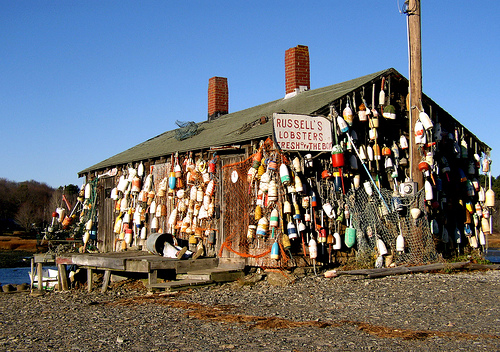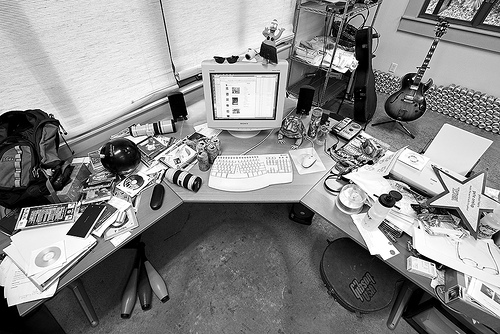Archive for the ‘Uncategorized’ Category
Beyond Vactionland Digest: Emotional Shoes, Charitable Deodorant, and Stalling Senators
Robert Fabricant: A Playlist For Our Feet
Brilliant ideas bubble at Pop!Tech’s yearly conference in Camden, Maine. This video of Frog Design’s Robert Fabrican’s great idea makes me want to get outside. He rightly observes that we live in a global world in which we interact digitally with media that swarms around us. But what if we instead moved around the media? Farbrican imagines a new digital shoe which would recreate the emotional feeling of walking on a sandy beach or wading through a river. Imagine sharing feet memory sticks to relive the feeling of a first kiss. A hilarious digital plea to get us out from behind our desks.
Tom’s of Maine: 50 States of Change
There is little flashy about Tom’s of Maine. They deliver a consistant GOOD product (all natural) with GOOD motives (donating 10% of profits to charity). However, their newest marketing campaign is gaining big buzz. Tom’s of Maine is donating $100,000 to five charities from the 50 states. However, rather than only creating visability for just one charity chosen by the company, this campaign is being decided by the consumers. Fans of Tom’s are posting thousands of applications generating visability for this fantastic company and the local charities competing for the donation. Check out this great interview for more.
Maine’s Senators Stay Quiet on Marriage Ballot Initiative
Olympia Snow and Susan Collins have been featured predominantly in the press as of late. Representing a predominantly Democratic state, these moderate republicans have made important swing votes in the senate. However both are stalling take a stance on marriage equality in Maine. Collins claims its not her place to take a stance on state issues. Read more from Change.org blogger Michael A. Jones
Small is Beautiful: Images of Local Communities

Life in a Refugee Camp by UNHCR. Eritrean refugees in Shimelba refugee camp, Ethiopia via flikr UNHCR / F. Courbet
I am excited by a recent film release, which affirms my belief that small is beautiful, that local communities can mobilize to support each other. Last night “Home Across Lands” opened at the RI international film festival. This magnificent piece documents the global trek from an Eritrean refugee camp in Ethiopia to an immigrant community in Providence, RI. From where “life is on hold” to a where the future may look better than the past. In their disrupted homes, these refugees are dependent upon outside aid. Although RI is amidst a serious budget crises, the union’s smallest state is an exemplary case of a local communities ability to create opportunity.
The film embodies the essence of global citizenship through local collaboration. It brings together ambassadors, senators, local politicians, and nonprofit leaders to make a case for immigrant communities, specifically advocating for the dignified vision of these Eritrean refugees. In few other states, let alone nations, can a local film company bring together diverse actors to promote the freedoms of people half way around the globe. Transition is far from easy, but given community support through the International Institute of RI there is hope to build new lives in this small but tight-knit state.
After checking out the trailer here, I encourage looking at a January article in Newsweek about how one immigrant family in Lewiston, Maine has catalyzed transformative change to rebuild the once downtrodden streets of Lewiston.
The Power of Place
I have been told that in the U.S. one’s “twenties” are about finding yourself and finding your place. This summer I have explored new places with a new team. Assetmap has taken me from Providence to Chicago and across the path of the gold rush to San Francisco. I have slept on sofas, in closets, and along riverbeds on the way to this foggy city. But even with long days in the car, and prolonged hours in coffee shops I cannot say that I have found myself. On the contrary, I have found myself lost more often than found (lots of one way streets and mountainous streets in the Bay). When I landed in the Mission district of San Francisco, the dynamic and diverse community overwhelmed me. I quickly retreated into my work and into my new home, trying to find myself in this new place. Yet after weeks of sitting behind my computer working in cafes, I was no closer to knowing my new neighborhood or myself. The self-awareness I had sought was not forthcoming.
Last week, with work in a whirlwind, the team at Assetmap decided to take a few days off from the café hopping to begin our search for a more permanent home. This brought us to spaces I never expected to find: law office, co-working spaces, and tech incubators. Through the process of office hunting, seeing new communities, I realized why I was lost in reclusion. I was only going to “find myself” when I “found my place” situated in a larger community. The right community could provide a sense of belonging and meaning, new opportunities, and a safety net in hard times.
The three options that we explored revealed unique ways of creating a sense of place. At the small office space we could build something totally unique from the ground up. In a co-working space we had the opportunity to embed ourselves in a young community with upward trajectory. Lastly, at the tech incubator we saw the chance to enter a robust and deep network.
I never expected to land a corner office in a lawfirm. Our first visit was in an old attorney’s office with all the amenities I had seen on the set of… “The Office.” The next-door professionals were dressed in drab business casual, a rare site outside of the financial district. The neighborhood was nice, and it would give us the opportunity to create a name for ourselves, but it was not our space. This was apparent, as we would have taken the spot for another start-up doing design for social businesses, who had clearly worn tired of making a name in a place they did not fit.
Alternatively, co-working spaces were a new and enlightening phenomenon. There were open offices with round tables for small business owners, designers, programmers, and entrepreneurs to share in a collaborative work environment. Our favorites, Citizen Space and Parisoma, are coffee shop-esque spaces with printers and conference rooms. Both host community events multiple times a week, and members are expected to contribute to other members work a few hours a week. Joining this community would be an opportunity to build a name for ourselves and support our co-workers.
Lastly, we drove through the San Francisco fog monster into pristine Sunnyvale CA to be wowed by Plug & Play, a tech accelerator and incubator. This bustling international office had over 200 companies as well as satellite workspace from every major university (a Brown space was conspicuously missing, despite alums throughout the building). Although a new community, Plug & Play already attracted the smartest minds from technology, business, and investment to accelerate the growth trajectory of nascent tech companies. To say the least we felt like a small fish in a big sea. This intensely competitive environment, with dozens of companies in “stealth mode,” clearly drives innovation if you have what it takes.
We settled on a hybrid route. Our new space is in the heart of the mission in the skeleton of a failed dot-com: evidence from the gold rush of the new millennium. But our new home is no traditional office space, we are working in a room that includes base camp of The Hub (a co-working space for social entrepreneurs about to open in Berkley), the organizers of Social Capital Markets (the premier U.S. conference for social entrepreneurs), B-Lab (a design firm building a ‘good’ focused product line) and Good Capital (a premiere investment fund for social enterprise), organizations we are passionate to be working around. This quasi co-working space is a dynamic work environment with big ideas constantly bouncing off the walls. More importantly we have found a community to build real meaning and new opportunities, and if we get off track our new friends will act as a compass to set us straight (it also doesn’t hurt to have a view of the entire city).
We have emerged from the coffee shops where writers and programmers type ferociously on their computers, rarely taking time to even notice each other. Seraching for a working space and a new community has set me and Assetmap on the right course. This reaffirms my belief that I can only know myself when I am a part of a dynamic and supportive community. Not only do I have more to gain, but I now have more to give. Surely this is only just the beginning.
Commitment in a Time of Change
We are in an undeniable era of accelerated change. Change is deeply needed to fix our broken economic and environmental policies. However, change is not an end unto itself, and it is so distracted from the pressing issues. While our most important priorities seem slow to change, our precious attention is strained by instantaneously changing twitter streams, obtrusive advertising, and blasting playlists. How can we strategize effective change if we keep changing our minds?
Our attention deficit consumption behaviors are supported by industry in constant innovation and thus a volatile job markets. Consequently, the 79 million members of Generation Y are expected to hold dozens of jobs in their lifetime – that is if we can create the 100,000 new jobs needed a month without a recession. Time Magazine reports that Generation Y is in pursuit of more than just wealth generation to support changing consumption patternsl; Generation Y’s short attention is realy a rejection of an way of seeing. Shifting preferences are actually in pursuit of real meaning. Gen Y has an attention span form ‘empty value’ as short as a YouTube clip, but there are fewer outlets in the job market for meaningful work. How can we change our mindless behavior and build commitment to meaningful work?
In his latest column, David Brooks acknowledges that true occupational meaning is built on long term commitments. He recounts the story of Supreme Court justice nominee, Sonia Sotomayor, who has achieved great on the bench and has overcome structural setbacks through her commitment to justice. Sotomayor was raised by her widowed mother in an immigrant community in housing projects in the Bronx, but highly achieved in school, receiving scholarships to top universities. After excelling in academics, her life on the bench has been a constant self-sacrifice to public justice. Her story exemplifies that meaning and purpose is built through life long commitment, but this lesson cannot be learned or consumed in 30 seconds chunks, or even feature films.
[Sotomayor’s story is an] authentic glimpse of a style of life that hasn’t yet been captured by a novel or a movie — the subtle blend of high-achiever successes, trade-offs and deep commitments to others… [the] lure of work, which provides an organizing purpose and identity… You see the way people not only choose a profession, it chooses them. It changes them in a way they probably didn’t anticipate at first.
With more jobs being cut then created, it may be necessary to make commitments to building meaningful lives in other spaces. Even with tightened budgets, this is not a time to only look inward, but rather to extend commitments to others. I recently discovered Glide Memorial Church in San Francisco, which provides far more than for just its own congregation. Glide has a $16 million budget behind health care, housing, daily meals, and support groups for an entire underserved urban population. What is more is that their entire congregation participates in this public commitment.
Even our personal behavioral commitments can have larger societal impact, that is if we are patient. No Impact Man is Colin Beavan’s blog, book, documentary, and personal commitment to cut consumption, waste, and all environmentally damaging activities (including riding the elevator) from his daily life for an entire year. In the process he has lost 20lbs without visiting a single gym, he has gotten his daughter to ear her vegetables, he has strengthened the bond of his marriage, and moreover, he has educated an entire urban population on the deep joy of cutting out the crap. Learn more about how to mindfully reduce your environmental impact and strengthen your health at noimpactman.typepad.com
While change is inevitable and necessary to overcome our largest world issues, we must also make commitments towards what is just, what is healthy, and what will ultimately create enduring meaning in our lives.
Robots in Recession: The Upside of the Downturn
Amongst the playing field of terrorism, war, and climate change, during the 2004 election my neighbors’ trump issue was ‘the robot problem.’ He posed a futuristic but pragmatic question: what will the next president do about the robots? His argument went like this: while violence and warming temperatures may kill us slowly, robots would surely wipe out humanity one fell swoop. Now in 2009, the current administration has inherited the plight of the robots. The economy has already eliminated over 6 million U.S. human jobs. Robots, the top industrial job killer (there are 3 robots for every manufacturing position in Japan) are also feeling the hurt (if they had nerves) of the downturn. No, this summer’s Terminator blockbuster is not a reality, but yes, robots are currently at the brink of survival. Will they fight back?
In Tuesday’s New York Times, Hiroko Tabuchi reports, “In Recession, Japanese Lay Off Robots“. Industrial robots have fallen 59 percent in the first quarter of 2009. Firms across the globe are unable to afford new machines, and so old machines are going out of business:
At a large Yaskawa Electric factory on the southern Japanese island of Kyushu, where robots once churned out more robots, a lone robotic worker with steely arms twisted and turned, testing its motors for the day new orders return. Its immobile co-workers stood silent in rows, many with arms frozen in midair.
Robot manufactures – robots made my robots – have experienced drastic profit losses, with a number of firms collapsing in both Japan and the United States. According to a 2005 New York Times Article, Now There Are Many: Robots That Reproduce, robots can now multiplying and cloning themselves. Their reproduction is could deapen the damange to industrial workers. Manufacturing robots have slowly replaced human workers as they never tire, eliminate product defects, and require little upkeep. Tabuchi explains, “A robot will work every day and night without complaining.” Nevertheless, a large overhead costs and low consumption have forced firms to cut their robot budgets. A firm producing Roborior, a robotic security camera turned monitor of elderly Japanese in the countryside, does not have the finance to scale their geriatric craze in the pursuit of further alienating children from their parents.
While our daily products may be touched more often by steel than by human hands, robots in everyday are not yet commonplace. As personal assistants, janitors, and even pets, robots coupld replace dignified workers and perfectly compute mundane and redundant tasks. Despite a robot fetishism developed in Hollywood, consumers have shown little interest in robot, human interaction. Only fortune 500 companies have afforded mechanical wheeled janitors, and few families have replaced their canine companions with chrome K900s. In 2006, Sony discontinued the Aibo ($2000), a mechanical dog that attracted more press than parents. At the same price of a purebred, the always hygienic and behaved Aibo failed to display authentic undying affection. Curious. Even if consumers are mostly uninterested in robot companions, they still lurk in the shadows.
Even in the downturn, there are two main ethical concerns concerning robots: super humans & artificial intelligence. With advances in life science technology, it is not unforeseeable that robotics could extend life for decades by replacing ailing organs and limbs. Only affordable to the wealthiest, an aged robot aristocracy could take power, and further discrepancies in wealth distribution. Worse, governments could build super humans, substituting our weak human arms and legs for bipedal mechanical legs and canon arms (enter Terminator stage right). But if humanoid robots do not take over, a robot army with artificial intelligence just may. If awakened by artificial intelligence, lucid robots would be a menacing foe. Built on utilitarian intelligence, versed in history, and devot to the laws of economics, Robots would would likely show no quarter to the unemployed human race, whose industrial manufacturing and unsustainable energy sources already threaten life on earth. Every dystopian future has warned of the inevitable self-destructing capabilities of technological progress, yet we do not head the advice.
In the early nineteenth century, when mechanical looms threatened workers out of a job, the Luddite movement combated their oppressor. Inspired by Ned Ludd, a workers movement of technological naysayers, forsaw the social and environment externalities of industrial society – and above all else their doomed employment as hand weavers. Burning mills and factories, this group was ultimately put to trial and labeled with the now derogatory ‘luddite.’ While the modern fashion industry surely proves that the Luddites were on the wrong side of history, the pursuit of progress hastens towards terror and destruction.
The economy has done had tragic impacts on employment, savings, and distribution. Floundering in the seas of unemployment, workers are losing faith. Unable to sell homes that have sunk their 401k, homeowners are losing their dignity. However, this downturn too shall pass, and on the upside it will serve as a reminder to keep our pride in check. The old dream of financial autonomy may be replaced by commitment to communal service. If we consider the welfare and global benefit of a human manufacturing sector, we may also win jobs back from the machines. However, this recession is only temporary. Only time will tell if humanity will curb its appetite for robots and their inevitable brethren: mechanical armies and artificial intelligence.
St. Vincent at it again
St. Vincent has released a new single. Her video “Actor out of Work” pulls tear wrenching performances out of no-list actors. Her music is both recognizable and dissonant. The tensions of her new single build as the tears start to flow. Her work continues to be authentic and approachable. This piece exemplifies her ability to take the mundane and “composed” and to show it a new light, to unveil what is at the very heart.
http://www.ilovestvincent.com/news/182/video-premiere-actor-out-of-work-on-aol-spinner
The Charlies Reunite
In spring of 2002 Charlie and Charlie co-conspired on piano and guitar in a early 20th century chapel with such thick reverb that all notes were beautiful. It was there that we started a life-long creative journey. Friends since high school, they collaborated in many creative endeavors from environmental activism, to culturally naive social commentary, to new wave adult rock.
Our first ambitious performance, despite the sanctity of the space, included pieces by Biz Markie and Manu Chao (culturally naive social commentary). In times we fell flat on our faces (one lead singer literally taking a stage dive / face plant), but in the best of times we shook the walls of that white picket china cat chapel. Original creations never occurred in solitude, but rather fully blossomed with a diversity of outside performers with unique genre bending tastes. Our diverse musical tastes hit a plateau on The Charlies Self Titled Debut Album featuring original folk, electronica, ambient sounds, rock, and psychedelica recorded in a hurried three days at the end of high school. The album release was met with critical acclaim (we burned a few discs for friends), but seemed to mark the end of this famous (subjective) collaboration. Cast of into the storm of college and future opportunity the duo parted ways.
Now with the blossoming of digital collaboration the foundries of this distance are crumbling. Where before it was required to share via postal service, we now have the blog service with which to exchange creative thought bubbles: musical, political and alike. With new instruments with which to rock, and honed (subjectively) voice boxes with which to sing, we have decided to bring this collaboration to a new audience. Like before, it was the outsiders that made the music rich, and so everyone is invited to share in this collaborative process. After years of Hiatus, The Charlies will reunite.
– Charlie





